
James White was a Northern Irish author of science fiction novellas, short stories and novels. He was born in Belfast and returned there after spending some early years in Canada. After a few years working in the clothing industry, he worked at Short Brothers Ltd., an aircraft company based in Belfast, from 1965 until taking early retirement in 1984 as a result of diabetes. White married Margaret Sarah Martin, another science fiction fan, in 1955 and the couple had three children. He died of a stroke.

Glen David Brin is an American science fiction author. He has won the Hugo, Locus, Campbell and Nebula Awards. His novel The Postman was adapted into a 1997 feature film starring Kevin Costner.

Gene Rodman Wolfe was an American science fiction and fantasy writer. He was noted for his dense, allusive prose as well as the strong influence of his Catholic faith. He was a prolific short story writer and novelist, and won many literary awards. Wolfe has been called "the Melville of science fiction", and was honored as a Grand Master by the Science Fiction and Fantasy Writers of America.
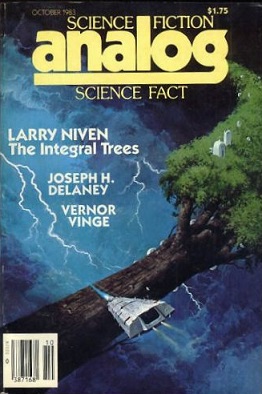
The Integral Trees is a 1984 science fiction novel by American writer Larry Niven. Like much of Niven's work, the story is heavily influenced by the setting: a gas torus, a ring of air around a neutron star. A sequel, The Smoke Ring, was published in 1987.
Michael Lawson Bishop was an American author. Over five decades and in more than thirty books, he created what has been called a "body of work that stands among the most admired and influential in modern science fiction and fantasy literature."

James Patrick Kelly is an American science fiction author who has won both the Hugo Award and the Nebula Award.

The Jaguar Hunter is a collection of science fiction, fantasy and horror stories by American author Lucius Shepard. Illustrated by J. K. Potter, it was released in May, 1987 and was the author's first book published by Arkham House. It was originally published in an edition of 3,194 copies, with a second printing later in 1987 of 1,508 copies. Bantam Books issued a trade paperback edition in 1989, and Four Walls Eight Windows reprinted the collection in 2001. The first British publication came as a Paladin Books trade paperback in 1988, followed quickly by a Kerosina Books hardcover. A Rumanian translation appeared in 2008.

Terry Carr's Best Science Fiction of the Year is an anthology of science fiction short stories edited by Terry Carr, the fourteenth volume in a series of sixteen. It was first published in paperback by Tor Books in July 1985, and in hardcover and trade paperback by Gollancz in October of the same year, under the alternate title Best SF of the Year #14.
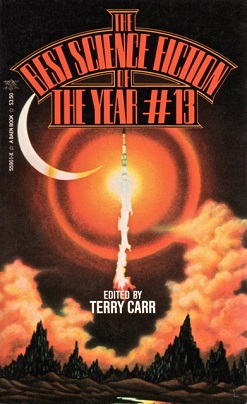
The Best Science Fiction of the Year #13 is an anthology of science fiction short stories edited by Terry Carr, the thirteenth volume in a series of sixteen. It was first published in paperback by Baen Books in July 1984, and in hardcover and trade paperback by Gollancz in December of the same year.

Terry Carr's Best Science Fiction of the Year #15 is an anthology of science fiction short stories edited by Terry Carr, the fifteenth volume in a series of sixteen. It was first published in paperback by Tor Books in August 1986 and in hardcover and paperback by Gollancz in October of the same year, under the alternate title Best SF of the Year #15.

Terry Carr's Best Science Fiction and Fantasy of the Year #16 is an anthology of science fiction short stories edited by Terry Carr, the sixteenth and last volume in a series of sixteen. It was first published in hardcover by Tor Books in September 1987. The first British editions were published in hardcover and paperback by Gollancz in December of the same year, under the alternate title Best SF of the Year #16.
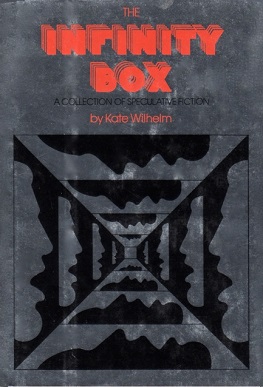
The Infinity Box is a collection of science fiction and fantasy stories by American writer Kate Wilhelm, published in hardcover by Harper & Row in 1975. It was reprinted in paperback by Pocket Books in 1976; a British edition was published by Arrow Books in 1979, and a French translation, Le Village, appeared in 1987. It placed ninth in the annual Locus Poll for best story collection. Four of the nine stories were nominated for the Nebula Award.
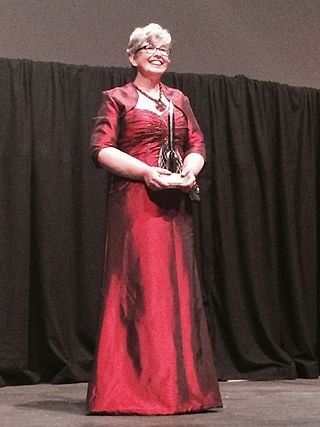
Ann Leckie is an American author of science fiction and fantasy. Her 2013 debut novel Ancillary Justice, in part about artificial consciousness and gender-blindness, won the 2014 Hugo Award for "Best Novel", as well as the Nebula Award, the Arthur C. Clarke Award, and the BSFA Award. The sequels, Ancillary Sword and Ancillary Mercy, each won the Locus Award and were nominated for the Nebula Award. Provenance, published in 2017, and Translation State, published in 2023, are also set in the Imperial Radch universe. Leckie's first fantasy novel, The Raven Tower, was published in February 2019.
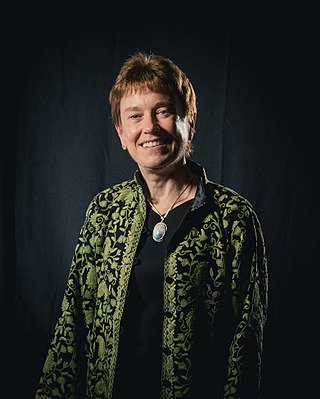
Carolyn Ives Gilman is an American historian and author of science fiction and fantasy. She has been nominated for the Nebula Award three times, and the Hugo Award twice. Her short fiction has been published in a number of magazines and publications, including Fantasy and Science Fiction, Interzone, Realms of Fantasy and Full Spectrum, along with a number of "year's best" anthologies. She is also the author of science fiction novels such as Halfway Human, which is noted for its "groundbreaking" exploration of gender.
This is a complete bibliography by American science fiction author Larry Niven:
This is a bibliography of American science fiction author Kim Stanley Robinson.

List of the published work of Robert Silverberg, American science fiction author.

Universe 13 is an anthology of original science fiction short stories edited by Terry Carr, the thirteenth volume in the seventeen-volume Universe anthology series. It was first published in hardcover by Doubleday in June 1983, with a paperback edition from Tor Books in March 1985. The first British edition was issued in hardcover by Robert Hale in March 1986.
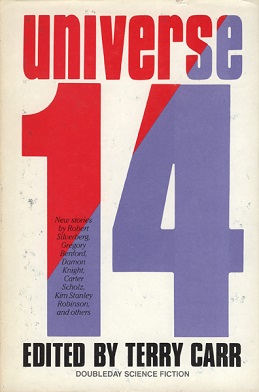
Universe 14 is an anthology of original science fiction short stories edited by Terry Carr, the fourteenth volume in the seventeen-volume Universe anthology series. It was first published in hardcover by Doubleday in June 1984, with a paperback edition from Tor Books in May 1986.

Universe 15 is an anthology of original science fiction short stories edited by Terry Carr, the fifteenth volume in the seventeen-volume Universe anthology series. It was first published in hardcover by Doubleday in August 1985, with a paperback edition from Tor Books in December 1987.

















